
views
X
Research source
Buying a Vehicle from a Dealer

Bring your title if you're trading in your old vehicle. If you're trading your old car for a new one and have a paper title for your old vehicle, fill out the transfer information and give it to the dealer. If your title is electronic, the dealer can access it and help you complete the transfer information. You must transfer ownership of your old vehicle before you can transfer your plate to your new vehicle. If you've already sold your old car, bring your plate with you when you go to the dealership to finalize the purchase of your new car.
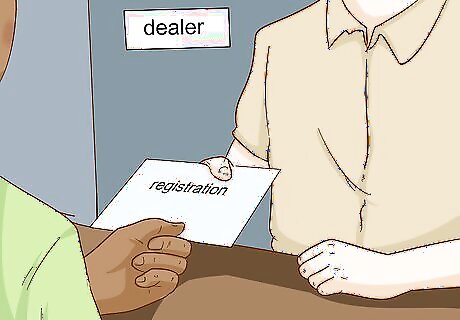
Give your current registration to the dealer. The dealer will need your current registration to complete the transfer process so you can put your plate on your new car. The dealer will then issue you a new registration document for your new car. Florida car dealerships submit registration transfer information electronically. You will leave the dealership with temporary transfer registration, but your permanent tag will be on your car. Your permanent registration will be mailed to you within a few weeks.
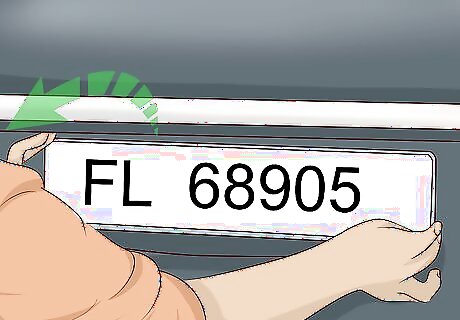
Transfer your plate to your new vehicle. Once the sale is complete and the dealer has reported the sale and transfer to the Florida Department of Highway Safety and Motor Vehicles (HSMV), you can simply take your plate off of your old car and install it on your new car. In many cases the dealer will go ahead and do this for you while they're processing the transaction and you're filling out and signing the necessary forms to complete the sale.
Buying a Vehicle from an Individual
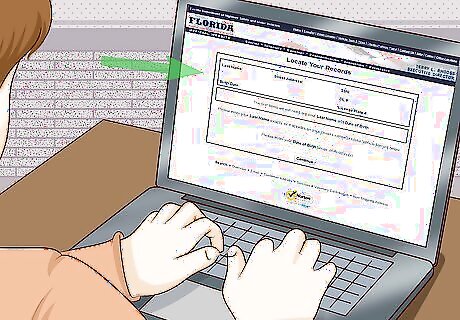
Fill in the transfer information on the back of the title. Your name and address, the date of sale, selling price, and mileage on the vehicle must be provided on the back of the title in the "transfer of title by seller" section. Both you and the seller must sign the back of the title. If the title is electronic, the owner can get it printed at the local tax collector's office, or online at https://services.flhsmv.gov/VirtualOffice/.
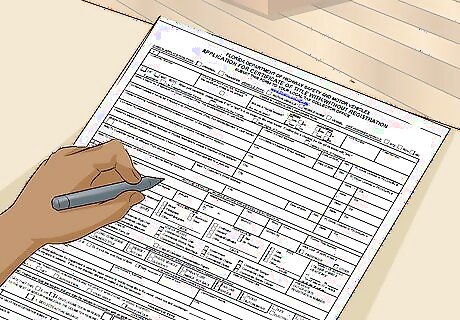
Fill out an application for title. Before you can transfer your plate to your new car, you must have the car titled in your name. Fill out the form completely – if any sections are left blank, your title won't be issued. You must include your Florida driver's license number.

Have the vehicle's VIN number verified. For used cars, Florida requires you to have a police officer or HSMV compliance examiner verify the vehicle's VIN number. The examiner's or police officer's signature must be notarized. There is a section on the title application form for VIN verification. You can also use a separate form if you prefer, available online at https://www.flhsmv.gov/pdf/forms/82042.pdf.
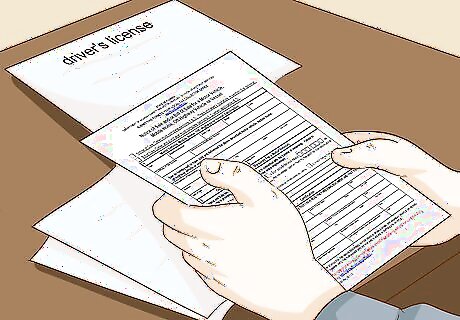
Gather required documents. Along with your application, you must provide proof of identification (typically your driver's license), proof of Florida insurance coverage for the vehicle, and a bill of sale for the vehicle that shows appropriate sales tax was paid on the vehicle (unless it is tax-exempt). To transfer your license plate, you also need a copy of your current registration. Transfers among family members, gifts, or even trades may not be subject to Florida's 6 percent sales tax. Not all counties require a bill of sale, but it is recommended regardless. Filling out the bill of sale is the seller's responsibility – as the buyer, you don't even have to sign it. You can download a form at https://flhsmv.gov/dmv/forms/BTR/82050.pdf if you need it.
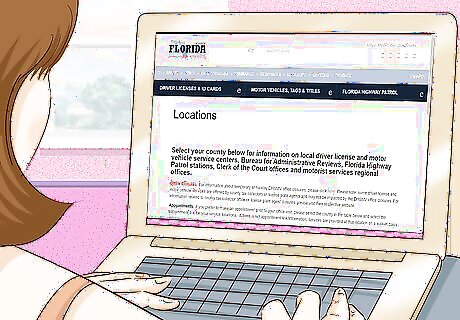
Visit your local tax collector's office. Take your application and documents to the tax collector's office for your county to complete the transfer of the vehicle. While not required, Florida tax collectors recommend that both you and the seller of the vehicle go together. You can find the location of your county tax collector's office, as well as your local HSMV, by visiting https://www.flhsmv.gov/locations/ and clicking on the name of your county. If you and the seller live in different counties, complete the transfer in the county where you live.
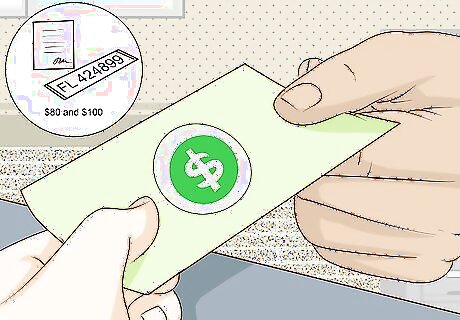
Pay the required title and registration fees. To transfer title of the vehicle and transfer your Florida license plate to the new vehicle, you'll typically pay between $80 and $100. You may be able to pay your fees online in advance. If you pay online, print a copy of the receipt for the transaction to take with you when you go to the tax collector's office in person. Most any method of payment is accepted if you're paying your fees in person, including cash, personal check, and major credit or debit cards. If you want to use a cashier's check or money order, call ahead to find out the exact total of your fees. If you didn't pay sales tax when you bought the vehicle, you must pay that as well before a title will be issued. Sales tax is 6 percent of the purchase price of the vehicle, less the value of any trade.
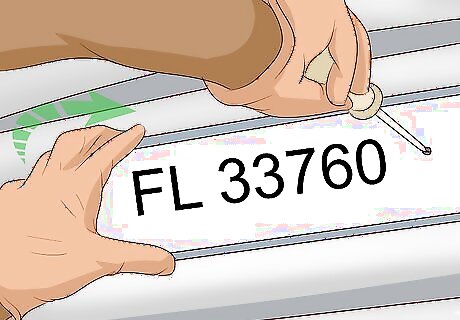
Put your plate on your new vehicle. When you submit your application and documentation and pay your fees, you can put your old plate on your new car immediately. You'll receive a temporary registration document to keep in your car until your permanent registration is issued. If you've already sold your old car, bring your plate with you to the tax collector's office so you can put it on your new car. Bring the appropriate tools with you so you can install the plate properly on the car.
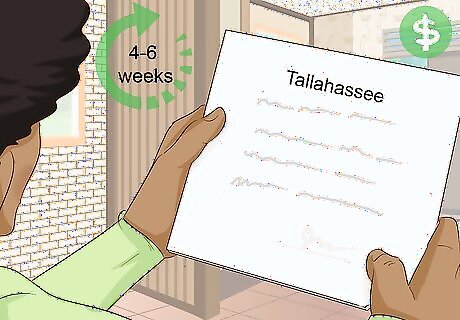
Receive your title for the vehicle. Once you've submitted all required documents and paid the fees, the HSMV will issue a new title for the vehicle in your name, along with new registration. You'll get these in the mail within 4 to 6 weeks. Some counties offer expedited service called "fast title" for an additional fee (typically around $10). With this service, you get your title immediately rather than having to wait for it to be mailed to you from Tallahassee.
Surrendering Your Plate
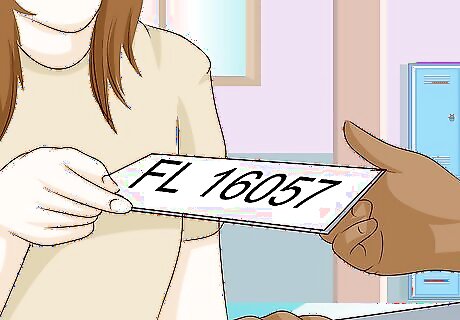
Turn over your plate in person. If you've sold your car and aren't planning on buying another to replace it within the next 30 days, you must surrender your plate and registration. You can do this in person at your nearest HSMV or tax collector's office. Go to https://www.flhsmv.gov/locations/ and click on the name of your county to find your nearest HSMV or tax collector's office.
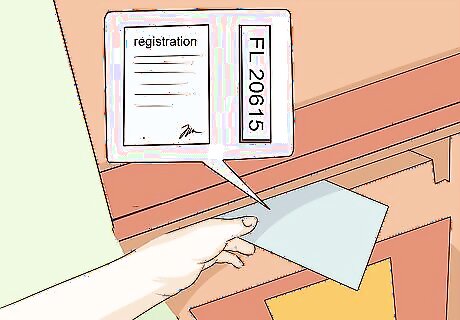
Mail your plate and registration to your county tax collector. You don't have to surrender your plate in person. You can surrender it by mailing it to the main tax collector's office. Check the contact information on your county tax collector's website, or call the office and ask. Include the plate and registration, along with a signed statement explaining the reason you are surrendering the tag.

Provide a signed statement if your plate is lost or damaged. If your plate is damaged or illegible and you have no intention of using it on another vehicle, you can also "surrender" it without sending in the actual plate itself. Mail or take in your registration along with a signed statement explaining what happened to your plate. You must include a statement to the effect that even if your plate is found, it will never be placed on another vehicle.


















Comments
0 comment